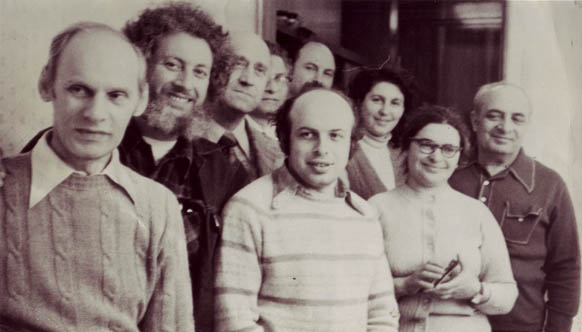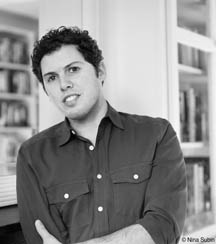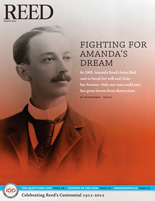
IRIS login | Reed College home Volume 90, No. 1: March 2011
Trapped in the USSR

Tangled up in Red: Anatoly Shcharansky (front, center) and other refuseniks in 1976. Shcharansky later spent 9 years in the Gulag before being released by Secretary Gorbachev. beit hatfutsot photo archive
A new book by Gal Beckerman ’98 explores the paradox of the Soviet Jews: stuck in a bureaucracy that would not let them go, but would not let them be.
By Peter Ephross

Gal Beckerman ’98 (above) has earned glowing reviews for When They Come for Us, We’ll Be Gone: The Epic Struggle to Save Soviet Jewry, published by Houghton Mifflin Harcourt, 2010.
In 1963, a young Latvian Jew named Yosef Mendelevich visited an anonymous clearing in the forest of Rumbuli, a stretch of brush and fir a few miles south of Riga, and realized with a shudder that he was standing on a mass grave.
Beneath his feet lay the bodies of 25,000 Jews, shot by the Nazis and their Latvian collaborators during World War II, yet there was no official sign that anything had taken place. Mendelevich joined other Jewish activists in transforming the spot into a memorial to the Holocaust—an act that unexpectedly launched the movement to allow Soviet Jews the freedom to emigrate, a movement that would become a focal point of international diplomacy and a model for human rights campaigns.
Writing about an issue with major geopolitical implications, so many players, and a lengthy time span makes a difficult topic for a first book, as Gal Beckerman ’98 readily admits. The history of the Soviet Jewry movement is “a very big story,” he says. “For a first book, the advice I would give someone would be to find a very narrow subject through which you could tell a bigger story: You write about that one baseball game in 1959 and use it to tell the history of the whole world.”
Gal overcame the obstacles. When They Come for Us, We’ll Be Gone has received widespread media attention and some glowing reviews from National Public Radio, the New Yorker, Tablet, the Nation, the New Republic, and Harper’s Magazine, which featured a lengthy essay revolving around the book, calling it an “impressive history.”
Tackling a challenge is nothing new for Gal; in fact, it is something of a lifelong pattern. As a child, he was shy, struggling to overcome a stutter, but he was still involved in school plays. “I think I was challenging myself, forcing myself to do something that felt so against my nature in order to somehow overcome all that awkwardness,” he says. “As perverse as it sounds, throwing myself in the water so I could learn how to swim.”
Gal’s grandparents survived the Holocaust; his parents were born in Israel. Growing up in the San Fernando Valley outside Los Angeles, he developed a strong Jewish identity. His intense focus on academics alienated him from his peers in high school, but he found a home at Reed. “I always had a hunger for reading and learning, and Reed taught me what to do with that,” he says. “Reed gave me an outlet, and this book is in some ways a continuation of that desire to be intellectually engaged.”
At Reed, he was inspired by a class taught by professor Pancho Savery [English, 1995–] on Ralph Ellison’s Invisible Man— “an incredible chance to explore one book in depth with a professor who understood the right balance between directing students and letting them discover on their own.” Professor Darius Rejali [political science, 1989–] was another powerful influence. Gal also acted in a couple of student plays, including a kabuki-style production of Bertolt Brecht’s The Beggar or the Dead Dog. He majored in English and wrote a creative thesis, a novella about the son of Israeli parents that drew heavily on his own personal experience.
After Reed, he took on another challenge—joining the Peace Corps. “I remember telling people, I’m going to go to the Peace Corps. They were like, ‘You don’t seem like the kind of person who would go into the Peace Corps.’ That really bothered me. That became my reason for wanting to go to the Peace Corps, because I wanted to be the kind of person who would do that.”
Gal served in Cameroon for two years, where he trained teachers and helped to set up a nursery school. Returning stateside, he decided to become a journalist—an intriguing career choice for a person who was once self-conscious. He earned a master’s degree in journalism from Columbia University and worked at the Columbia Journalism Review until joining the Jewish newspaper The Forward in 2009. He’s also been a fellow at the Alexander von Humboldt Foundation in Berlin.


LATEST COMMENTS
steve-jobs-1976 I knew Steve Jobs when he was on the second floor of Quincy. (Fall...
Utnapishtim - 2 weeks ago
Prof. Mason Drukman [political science 1964–70] This is gold, pure gold. God bless, Prof. Drukman.
puredog - 1 month ago
virginia-davis-1965 Such a good friend & compatriot in the day of Satyricon...
czarchasm - 4 months ago
John Peara Baba 1990 John died of a broken heart from losing his mom and then his...
kodachrome - 7 months ago
Carol Sawyer 1962 Who wrote this obit? I'm writing something about Carol Sawyer...
MsLaurie Pepper - 8 months ago
William W. Wissman MAT 1969 ...and THREE sisters. Sabra, the oldest, Mary, the middle, and...
riclf - 10 months ago